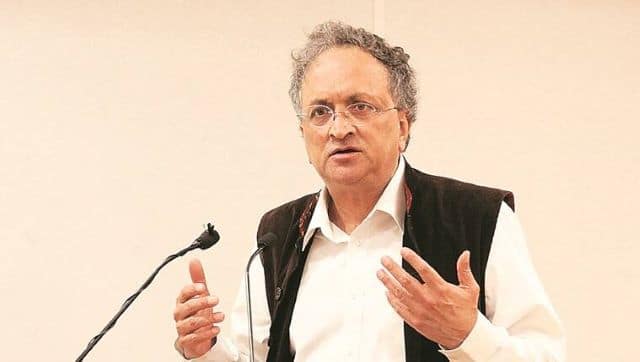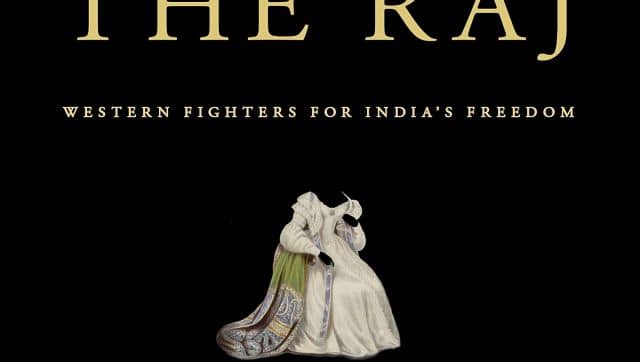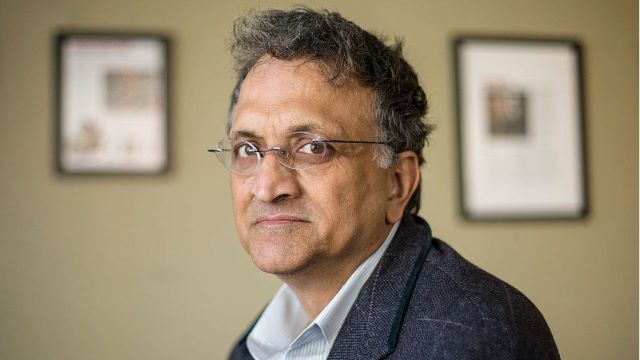Ramachandra Guha’s latest book, Rebels Against the Raj, is a fascinating story of seven foreigners, who lived in India at differing times between 1893 and 1984, and in the course of this tumultuous century, made the country and her many struggles their own.
All independent thinkers and selfless doers, they served India with remarkable spiritedness and devotion. You may have heard their names or read about them — Annie Besant, BG Horniman, Samuel (later Satyanand) Stokes, Madeline Slade (later Mira Behn), Philip Spratt, Richard Ralph Keithahn, and Catherine Mary Heilemann (later Sarala Behn).
However, in his latest offering, Guha carefully weaves their lives together, building on extensive research, and drawing from rare, previously untouched material that he procured from all sorts of diverse and obscure sources. The result is this ambitious book that, in looking at what was, throws light at what could be.
In this exclusive interview, India’s leading historian discusses his new book Rebels Against the Raj, his writing process, shares advice for young historians, and more.
You have written on subjects as diverse as the environment, peasant resistance, cricket, and of course, Mahatma Gandhi. How do decide what to write on, especially with books?
I select the themes of my books based on curiosity and the desire to learn more. To research and write a work of historical scholarship can take anywhere from three to 10 years. So one must choose only those subjects which can sustain one’s interest and excitement for extended periods of time.
Although I have indeed written books on a range of topics, there are some themes I resolutely stay clear of. These include economics and technology, which I leave to other and better-qualified hands. In any case, history, sociology, politics, and cricket are enough to keep me occupied for this lifetime.
[caption id=“attachment_10299171” align=“alignnone” width=“640”]  Ramachandra Guha[/caption]
You mention in Rebels Against the Raj that it was long in the making. What propelled you to finally get it out now?
In 1999, I published Savaging the Civilized, a biography of Verrier Elwin, an Oxford scholar and son of a colonial Bishop, who went on to become the foremost authority on India’s Adivasi communities. Among Elwin’s abiding regrets was that, for all his identification with India, he never went to jail during the time of the Raj. Ever since I have wanted to write a companion volume to that biography, a group portrait of foreigners who so decisively became Indian that they even went to prison for India’s cause.
After my book on Elwin, I wrote a social history of sport, A Corner of a Foreign Field, which centres around a family of Dalit cricketers. Then I was commissioned to write India after Gandhi, a book that took me (because of the scope of the project) a full decade to research and write. I now decided to settle my accounts with Gandhi, a figure who had fascinated me since I began my professional career. I first encountered Gandhi through his influence on Indian environmentalism, and then he popped in and out of my later books as well. So I thought I must write a biography of Gandhi, which took another decade.
However, all this while, I knew I would have to one day write this book on these rebels against the Raj. While working on other projects, I kept gathering archival material on them. After the second volume of my Gandhi biography was published in 2018, I turned to classifying and organising my notes, and began drafting chapters.
In retrospect, I am glad the project took so long, for it allowed me to gather all this new material, and because the rising tide of xenophobia the world over made the stories of these extraordinary individuals all the more compelling to me, and hopefully to the readers of the book too.
What do you find the most challenging when writing about history?
When I was young, we were told to write ‘Marxist’ history. Now, in my 60s, I am told I must write ‘nationalist’ history. Such ideological straitjackets can be crippling to the historian. In an essay published in the India Forum some years ago, I argued that the historian must be vigilant against several forms of chauvinism — which I termed the chauvinisms of discipline, method, identity, ideology, and nationalism respectively.
Keeping one’s work nuanced, many-sided, and above all non-chauvinist or ideally even anti-chauvinist — this is the challenge the historian must confront, and seek to overcome.
A historian is not a party man, nor an ideologue, and certainly not a prophet.
Rather, the historian seeks to recreate the past with as much sensitivity and subtlety as the sources at her command, and the analytical skills she possesses can allow.
What is your writing process like?
I compare the process of writing to the musician’s riyaz. One must set aside several hours each day to your craft, and in this period, one must work absolutely uninterruptedly, alone with your thoughts and your notes, with nothing to distract you.
I normally write in the mornings, between breakfast and lunch. In this period, I don’t have my phone with me, and don’t answer emails either. Other writers may find evenings or nights more congenial to their temperament. The important thing is to put in the hard yards, to work several hours at a stretch every day, at least five and preferably six days a week, and all through the year.
I always take a print-out of what I write each day. I know some younger writers like to revise only on the screen, but I find that one spots errors or infelicities of expression far easier when reading type on paper.
In the book, you specify that their incarceration and coming to India alone were key to your choosing these seven rebels. There must have been more foreigners who fought against the Raj with as much commitment and fearlessness. Why shortlist just these seven?
In the epilogue to my book, I mention a few of these other rebels. The seven I myself chose to focus on had very unusual and exciting lives. They opposed the Raj, often heroically, while at the same time casting a sharp spotlight on the ills of Indian society — such as gender and caste discrimination, and environmental abuse. These seven individuals were anti-colonial activists as well as harbingers of an independent and democratic India. They were both rebels and nation-builders.
I was able to find loads of rich, rare, and often previously unused archival material on all of these individuals. This included not just intelligence reports and colonial government files, but also love letters and family papers. Because of what I found in the course of my research, I was able to flesh out each of these seven lives in some detail.
The first of my rebels, Annie Besant, arrived in British India in 1893. Four of the seven lived on to make major contributions to independent India. The last to die, the American-born Dick Keithahn, passed away in the small southern town of Oddanchatram in 1984. Through these intertwined lives, the book recreates a century of tumultuous history for India and Indians.
[caption id=“attachment_10299161” align=“alignnone” width=“640”]  Book cover of Rebels against the Raj[/caption]
In the epilogue, you mention you have not written this book for nativists or xenophobes, and yet you hope they read it.
While this book is principally a work of biographical history, the story of seven extraordinary individuals in their times, I hope it also speaks to the present moment. India today is in the grip of xenophobia, the belief that Indians know everything, and that we have nothing to learn from other cultures. This book shows us that foreigners can sometimes teach us things that are important, that foreigners working in India can sometimes make our country a more interesting and more peaceable place.
Of the seven people whose stories you share in this book, is there any one who you are fond of or who inspires you more than the others?
A parent who has more than one child is not supposed to play favourites between them. Likewise, biographers cannot be partial to any one of their biographical subjects. I enjoyed working on Verrier Elwin, I enjoyed working on Gandhi, I enjoyed writing about the great Dalit cricketer Palwankar Baloo, and I enjoyed finding out more about each one of these seven rebels against the Raj. They were all brave, courageous, impulsive, reckless — in a word, independent-minded. I was fascinated by all of them. I was particularly pleased that three of these seven were women since my previous biographical subjects were all male. That they came to India at different times, that they lived in different parts of the country (from the Himalaya to the deep South), and that they had different sorts of encounters with Indians added to the interest and excitement.
Is there a key learning you would like to share with young historians and biographers?
When I was a young historian, I consistently disregarded the advice that senior scholars gave me. My Marxist teachers in Kolkata told me that environmentalism was ‘a bourgeois deviation from the class struggle’ — I ignored them, and wrote on the Chipko movement anyway. The great Indian anthropologist MN Srinivas told me not to waste my time working on Verrier Elwin, since Elwin was merely an ‘amateur ethnographer.’ I went ahead and wrote my biography of the man. Agents and publishers told me to keep India after Gandhi to a maximum of 500 pages in print — it turned out to be twice as long.
So my advice to younger historians and biographers would be — in choosing what to write about, politely ignore the advice of those older or more famous than you, and follow your own instincts and interests. However, after you have yourself chosen the theme of your next book, make sure that in the research and writing, you stay clear of the chauvinisms of discipline, method, identity, ideology, and nation.
Do you think we need another set of renegades to rebel against the current raj?
This book is dedicated to Jean Dréze, the Belgian-born scholar who is India’s foremost development economist. Jean, whom I am proud to call a friend, is a renegade of our times. He is one among many remarkable foreigners who continue to do good work for, and in, India.
As for what has to be done about (or against) the current Raj, historians should stay away from prescription. This book has not been written to influence Indians with regard to their political preferences or personal choices. I hope, however, that readers of Rebels against the Raj will come away with a deeper understanding of the India that was, and perhaps also of the India that might be.
Rebels against the Raj is published by Penguin Books.
When not reading books or watching films, Sneha Bengani writes about them. She tweets at @benganiwrites.


)
)
)
)
)
)
)
)
)



